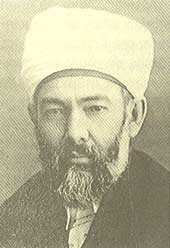Muhammed Hamdi Yazır facts for kids
Quick facts for kids
Muhammed Hamdi Yazır
|
|
|---|---|

Elmalılı Muhammed Hamdi Yazır
|
|
| Born | 1878 Elmalı, Antalya, Ottoman Empire
|
| Died | 27 May 1942 |
| Scientific career | |
| Fields | Islamic jurisprudence, Islamic theology, Qur'anic exegesis, Kalam, Islamic philosophy, Philosophy, Logic, Lexicography |
Muhammed Hamdi Yazır (born 1878, died 1942) was a very important Turkish scholar. He was also known as Elmalılı Hamdi Yazır. "Elmalılı" means "from Elmalı," which was his hometown.
He was a theologian, which means he studied religion. He also understood logic, translated the Qur'an, and explained its meanings. He was an expert in Islamic law, a philosopher, and someone who wrote for encyclopedias.
Contents
Early Life and Family
Muhammed Hamdi Yazır was born in 1878. His birthplace was a town called Elmalı in Antalya, which was part of the Ottoman Empire then. Today, it is in Turkey.
His father, Hoca Numan Efendi, was also a scholar. He came from a village called Yazır. Muhammed Hamdi's father moved to Elmalı for his own studies and stayed there. He worked as a chief clerk for legal cases in the district. Muhammed Hamdi's mother, Fatma Hanım, was the daughter of another scholar named Esad Efendi.
His Journey to Education
In 1885, after finishing his early schooling in Elmalı, Yazır moved to Istanbul. Istanbul was the capital city of the Ottoman Empire at that time. He went there to study Islamic sciences.
He completed his university studies at the Bayezid Madrasah. A madrasah is a school for Islamic learning. Later, he finished his education at Mekteb-i Nuvvab. This school trained people to become Qadis, which are like judges in Islamic law.
Yazır also took special classes to learn Islamic calligraphy. This is the art of beautiful writing. He learned Arabic, Persian, and French. He was so good at French that he translated some French books into Turkish.
A Career in Teaching and Law
After becoming a Qadi (judge), Muhammed Hamdi Yazır started teaching. From 1905 to 1908, he was a full-time teacher at Bayezid Madrasah.
Later, he worked for the Sheikh ul-Islam, who was the highest religious authority. He taught at several important schools. He taught about property law at Mekteb-i Mülkiye. He taught logic at Süleymaniye Madrasah. He also taught fiqh (Islamic law) at Medreset-ul-Vaizin, a school for preachers.
He also served in a high council called Darü'l-Hikmeti'l-İslâmiye. This council advised the Sheikh ul-Islam. Eventually, he became the president of this important council.
In Public Service
Muhammed Hamdi Yazır was involved in the political changes of his time. When he was working for the Sheikh ul-Islam, there was a big change in the government. He wrote a special religious opinion, called a fatwa, which was part of the process to end the rule of Sultan Abdul Hamid II.
He became a member of the senate in the Ottoman Parliament for Antalya. He did not agree with the Committee of Union and Progress, a group that had strong nationalist ideas. He also served as a minister for Vakıflar, which managed religious foundations and charities. This was during the time of Sultan Mehmed VI.
When the Republic of Turkey was founded, he was teaching logic. The new government, led by Mustafa Kemal, closed the old religious schools. Instead, they opened new schools. At this time, Mustafa Kemal asked Yazır to write the first modern Turkish translation of the Qur'an.
After this, Yazır spent about 20 years studying and writing in quiet solitude. He passed away on May 27, 1942, in Istanbul, due to heart problems. He is buried in Sahrayı Cedit Cemetery in Istanbul.
His Important Writings
Muhammed Hamdi Yazır wrote many books and articles. He focused on logic, philosophy, Islamic jurisprudence (law), and Islamic theology (religion).
In his philosophical works, he believed that faith and reason work together to find the truth. He thought that the human mind alone was not enough. This idea was similar to the famous scholar al-Ghazali from the 11th century. He also worked on explaining the Qur'an in the Maturidi tradition. He even started a dictionary of law.
Key Books by Muhammed Hamdi Yazır
- Hak Dīni Kur'an Dili (1935): This is his most famous work. It is a detailed explanation and translation of the Qur'an in Turkish. Mustafa Kemal ordered him to write it.
- Tahlil-i Tarih-i Felsefe-Metâlib ve Mezahib-Maba'de't-Tabia ve Felsefe-i İlahiyye: This was his Turkish translation of a French book on the history of philosophy.
- İrşadü'l Ahlâf fî Ahkâmi'l-Evkâf: A textbook for university students about the laws of religious endowments.
- Beyânul-Hak: A collection of articles he wrote for scholarly journals.
- Elmalılı Küçük Hamdi: More articles published in journals.
- Usûl-i Fıkıh: An unpublished book about Islamic law.
- Sûrî mantık: An unpublished book about logic.
- Hukuk Kâmusu: A dictionary of law that he did not finish.
- Divan: An unfinished book of poetry.
Images for kids
 | Bayard Rustin |
 | Jeannette Carter |
 | Jeremiah A. Brown |


